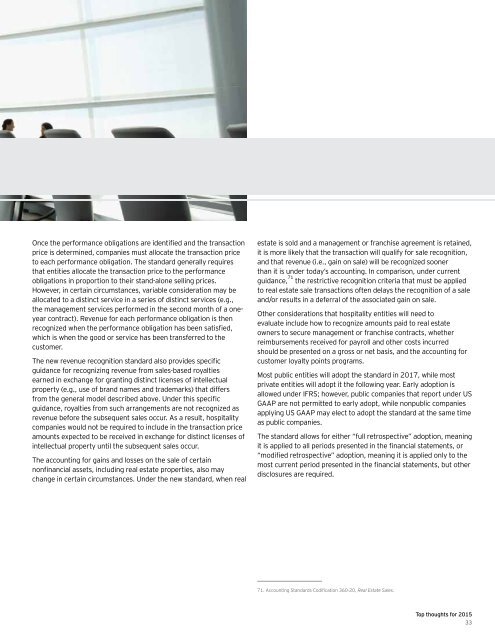ey-global-hospitality-insights-2015
ey-global-hospitality-insights-2015
ey-global-hospitality-insights-2015
Create successful ePaper yourself
Turn your PDF publications into a flip-book with our unique Google optimized e-Paper software.
Once the performance obligations are identified and the transactionprice is determined, companies must allocate the transaction priceto each performance obligation. The standard generally requiresthat entities allocate the transaction price to the performanceobligations in proportion to their stand-alone selling prices.However, in certain circumstances, variable consideration may beallocated to a distinct service in a series of distinct services (e.g.,the management services performed in the second month of a on<strong>ey</strong>earcontract). Revenue for each performance obligation is thenrecognized when the performance obligation has been satisfied,which is when the good or service has been transferred to thecustomer.The new revenue recognition standard also provides specificguidance for recognizing revenue from sales-based royaltiesearned in exchange for granting distinct licenses of intellectualproperty (e.g., use of brand names and trademarks) that differsfrom the general model described above. Under this specificguidance, royalties from such arrangements are not recognized asrevenue before the subsequent sales occur. As a result, <strong>hospitality</strong>companies would not be required to include in the transaction priceamounts expected to be received in exchange for distinct licenses ofintellectual property until the subsequent sales occur.The accounting for gains and losses on the sale of certainnonfinancial assets, including real estate properties, also maychange in certain circumstances. Under the new standard, when realestate is sold and a management or franchise agreement is retained,it is more likely that the transaction will qualify for sale recognition,and that revenue (i.e., gain on sale) will be recognized soonerthan it is under today’s accounting. In comparison, under currentguidance, 71 the restrictive recognition criteria that must be appliedto real estate sale transactions often delays the recognition of a saleand/or results in a deferral of the associated gain on sale.Other considerations that <strong>hospitality</strong> entities will need toevaluate include how to recognize amounts paid to real estateowners to secure management or franchise contracts, whetherreimbursements received for payroll and other costs incurredshould be presented on a gross or net basis, and the accounting forcustomer loyalty points programs.Most public entities will adopt the standard in 2017, while mostprivate entities will adopt it the following year. Early adoption isallowed under IFRS; however, public companies that report under USGAAP are not permitted to early adopt, while nonpublic companiesapplying US GAAP may elect to adopt the standard at the same timeas public companies.The standard allows for either “full retrospective” adoption, meaningit is applied to all periods presented in the financial statements, or“modified retrospective” adoption, meaning it is applied only to themost current period presented in the financial statements, but otherdisclosures are required.71. Accounting Standards Codification 360-20, Real Estate Sales.Top thoughts for <strong>2015</strong>33


